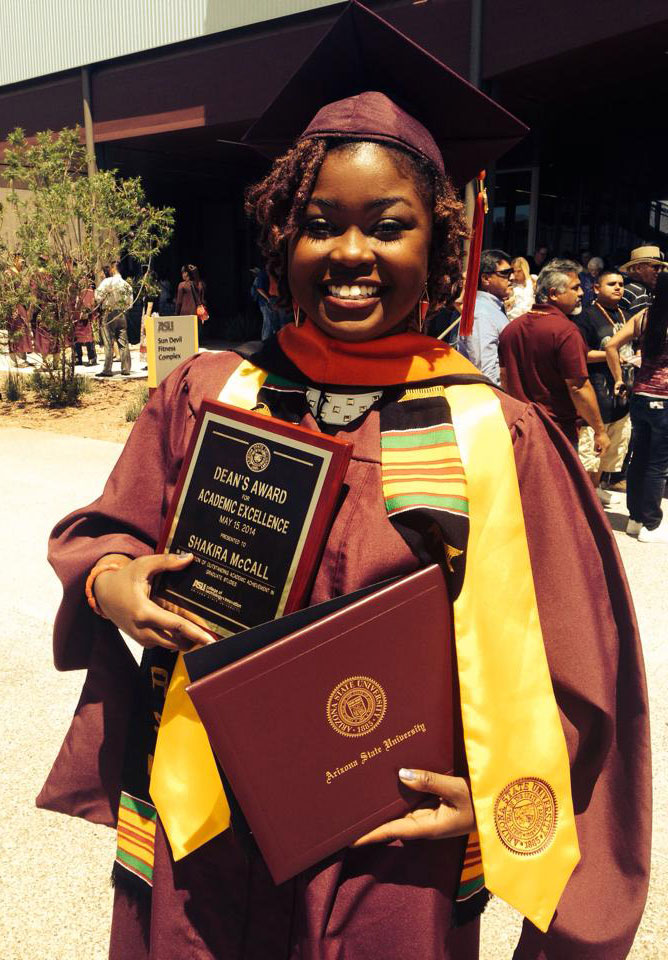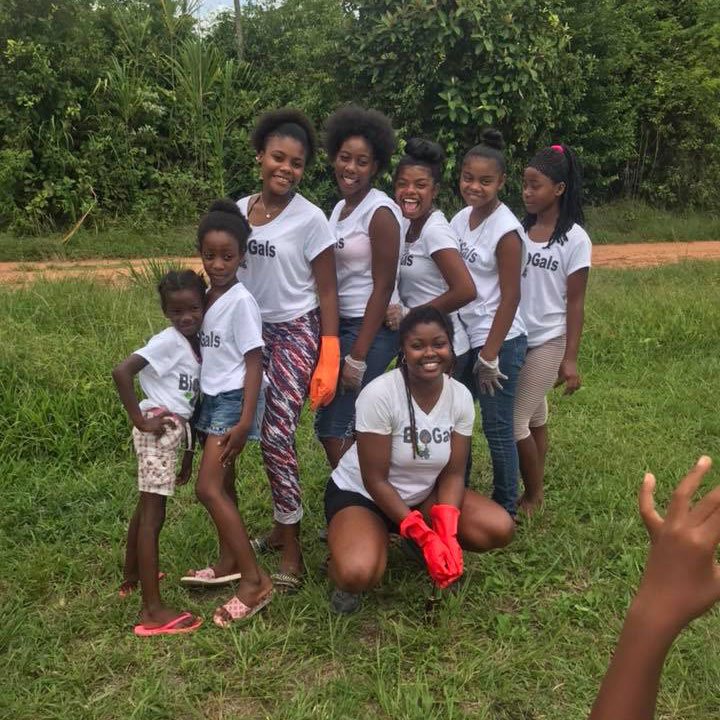Engineering alum empowers women of color to engineer solutions for sustainable development

Shakira Hobbs (left) and Evvan Morton (right) with their anaerobic digester prototype in Sittee River, Belize. Photo courtesy of Evvan Morton
Shakira Hobbs had an idea as an engineering graduate student in 2014, and she transformed it into a globally impactful nonprofit only five years later.
Hobbs, who attended The Polytechnic School, one of the seven schools in the Ira A. Fulton Schools of Engineering at Arizona State University, first thought of a way to bring community engagement research to STEM fields as a National Science Foundation Integrative Graduate Education and Research Trainee for the sun utilization network, or what's known as an IGERT-SUN Fellow.
Her idea became BioGals, an organization that empowers women of color from around the world to engineer dynamic solutions for sustainable development. BioGals works to establish a legacy of changemakers who embody cultural diversity.
The organization is currently leading sustainability efforts, specifically regarding food waste solutions, in a rural community in Belize using anaerobic digestion systems. Anaerobic digestion is the process by which microorganisms break down biodegradable material to manage waste and/or produce energy.
One of the group’s current projects includes the pilot design and implementation of a biodigester device to convert food waste into an energy source for cooking school lunches. The BioGals team is also collecting water and soil samples across Belize and in the U.S. in Kentucky. The work is part of a National Science Foundation award Hobbs is leading through the University of Kentucky, to investigate traces of glyphosate — a chemical compound found in weed killer — with the goal of reducing its environmental impact and safeguarding human health.
Community engagement is another significant pursuit of the BioGals mission. Hobbs and her board, composed of STEM experts from across academia and industry, host nationwide summer programs for students interested in including sustainability initiatives in their daily routines.
From community engagement to collaborating with other women of color in STEM-related fields, BioGals is committed to combining knowledge from diverse groups to make a difference.
“We decided to bring this experience to other women of color — those who are looking for a sense of belonging and creative space,” Hobbs said. “I suspect that part of the reason women of color feel a connection to a place like Belize may have something to do with the unique connection of being part of the African diaspora. We know what it feels like to be marginalized in a country we call home, so having a unique creative environment in this space felt like something we wanted to share with other women of color.”
Shakira Hobbs graduated from ASU in May 2014 with a Master of Science in engineering. She received the Dean’s Award for Academic Excellence. Photo courtesy Shakira Hobbs
Along with running BioGals, Hobbs is an assistant professor of civil engineering at the University of Kentucky, where she teaches courses in sustainable engineering and humanitarian engineering.
“I research global challenges at the food, energy, water nexus,” Hobbs said. “They all have unique problems, and I tackle that by looking at ways to manage food waste through anaerobic digestion and recovering energy from the process.”
She has been interested in this field since her time as a student at ASU, and was introduced to it by her faculty adviser, Bradley Rogers, the former associate director of The Polytechnic School.
Her engineering background as well as her experience as a woman of color in STEM academia led to the development of BioGals.
From concept to reality
When Hobbs first visited Belize during a study abroad program, she was drawn to the country and its people. She wanted to become an engineering changemaker there after becoming acquainted with the natives and their unique culture.
“I was fascinated by cultural competency, understanding how communities live and letting them identify the problems,” Hobbs said. “This translated to my work in Belize.”
During her time in the IGERT-SUN cohort at ASU, Hobbs met sustainable engineering doctoral student Evvan Morton, who eventually became the BioGals co-founder. Morton was also an IGERT-SUN Fellow at ASU and, together, they wrote a funding proposal for the BioGals concept.
Morton is now the vice president of BioGals and an American Association for the Advancement of Science (AAAS) Science and Technology Policy Fellow for the U.S. Department of Energy, Office of Sustainable Transportation.
“When we first went to Belize, we wanted to show the importance of including community engagement in a technical project, and I think that’s what makes us unique,” Morton said. “We’re told how to enhance a technology, how to research it and how to solve a problem, but we don’t always talk about how that technology affects the livelihood of the people it’s meant to benefit.”
During their first two trips to Belize, Hobbs and Morton conducted surveys to see if anaerobic digestion would benefit the community’s energy issues.
“Since they have a lot of fruit trees and so much of it that drops gets wasted, we thought that would be a good source of organic waste we could use, as well as the manure from farms in the area,” Morton said. “We also wanted to figure out a way to create a sustainable waste management process, because the village usually burned waste, so we wanted to reduce that and integrate recycling and other sustainable waste mechanisms.”
Support and mentorship
Hobbs was supported by various ASU faculty during her quest to launch BioGals, including her mentor, Mark Henderson, President’s Professor emeritus and a former Fulton Schools engineering professor. He wrote a letter of support when Hobbs and Morton applied for project funding.
Community members of Sittee River in Belize pose with Shakira Hobbs after loading the anaerobic digester with pig manure. Photo courtesy of Shakira Hobbs
“(Polytechnic School faculty member) Bradley Rogers and I both saw a bit of ourselves in Shakira — she is absolutely tenacious,” Henderson said. “It’s a lot of fun to see our graduates go far and accomplish their dreams, and that’s exactly what Shakira did.”
Wim Vermaas, associate director of research and training initiatives for the ASU School of Life Sciences and former principal investigator of the IGERT-SUN grant, fondly remembers Hobbs’ and Morton’s dedication to their project.
“It’s great to see students take initiative and run with their ideas,” Vermaas said. “It was their idea, their project, and it was outside their scope, but it was important to them and became more than a little project.”
The future of BioGals
Hobbs, Morton and the BioGals board are highly motivated by their work in Belize. From local community involvement, to empowering women of color in STEM fields, to making energy sustainability strides in Belize, BioGals is making multilevel impacts.
“Belizean community members weren’t used to seeing people of color doing technical projects. It felt like we were breaking stereotypes about women of color and that this could be a good opportunity to empower other women of color to enter STEM fields,” Morton said. “When we got the funding through the IGERT program, we had no intentions of starting a nonprofit; it was purely a research opportunity, but we realized the impact we were making.”
Morton says she believes it’s important to instill confidence in women of color in STEM fields, especially when they may be the only person who looks like them in an academic or professional engineering setting.
In October, BioGals hosted faculty and students at their first virtual gala, where they shared a mini documentary about the inception of BioGals and goals for the future, including the acquisition of land in Belize.
They hope to develop the land into a research and development hub for future undergraduate and graduate students to be able to do more sustainable energy projects.
Long-term, Hobbs, Morton and the BioGals board hope to expand their work to other countries.
To support the BioGals mission, visit their donation website. To get involved with BioGals, fill out this form or email info@biogals.com.
More Science and technology

Hack like you 'meme' it
What do pepperoni pizza, cat memes and an online dojo have in common?It turns out, these are all essential elements of a great…

ASU professor breeds new tomato variety, the 'Desert Dew'
In an era defined by climate volatility and resource scarcity, researchers are developing crops that can survive — and thrive —…

Science meets play: ASU researcher makes developmental science hands-on for families
On a Friday morning at the Edna Vihel Arts Center in Tempe, toddlers dip paint brushes into bright colors, decorating paper…



